Heinrich Wilhelm Ernst: Complete Works, Volume Five
Heinrich Wilhelm Ernst (1812–65) was one of the leading musicians of his day, a friend of Berlioz, Chopin, Liszt and Mendelssohn, and for Joseph Joachim ‘the greatest violinist I ever heard’. But the popular encore pieces by which Ernst is remembered today represent only a fraction of his output. This fifth CD – in series of seven presenting all his compositions for the first time – shows his mastery of large- and small-scale forms: the Polonaise de Concert and Variations on the National Anthem are grand and brilliant compositions for the concert hall, while the sparkling operatic miniatures and tender arrangements are altogether more intimate.
Sherban Lupu, violin
Ian Hobson, piano
Listen To This Recording:
- Polonaise de Concert, Op. 17
- Feuillet d’Album, L’Art de Phraser, Op. 16, No. 14
- Rondino No. 3 in D on Meyerbeer’s Robert le Diable
- Rondino No. 1 in F on Carafa’s Natalie
- Rondino No. 2 in A on Halevy’s La Tentation
- Introduction: Moderato
- Theme: Moderato
- Var. 1: Brillante
- Var. 2
- Var. 3: Tranquillamente
- Var. 4: Adagio
- Finale: Allegro
- Air de Danse du 16eme Siecle
- Introduction: Maestoso
- Theme: Quasi andante
- Theme: Quasi andante
- Var. 2: Au talon en tirant
- Var. 3: Piu mosso
- Finale: Piu mosso
Trois Rondinos Brillants, Op. 5:
Brilliant Variations:
Air de Danse du 16eme Siecle
Variations de Bravoure, Op. 18:
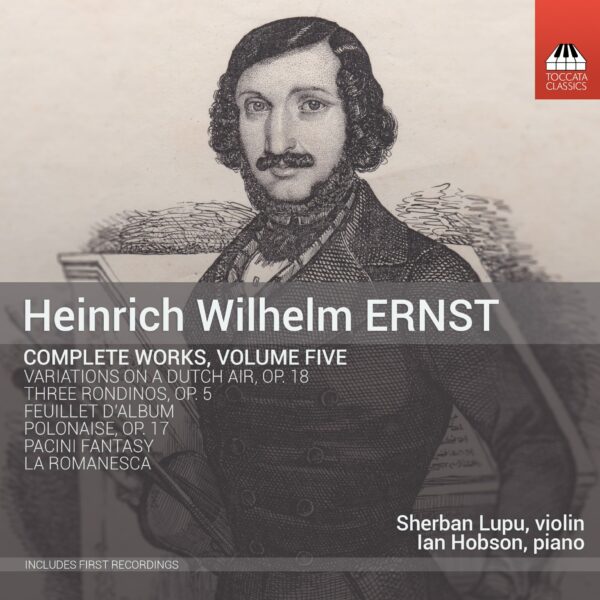
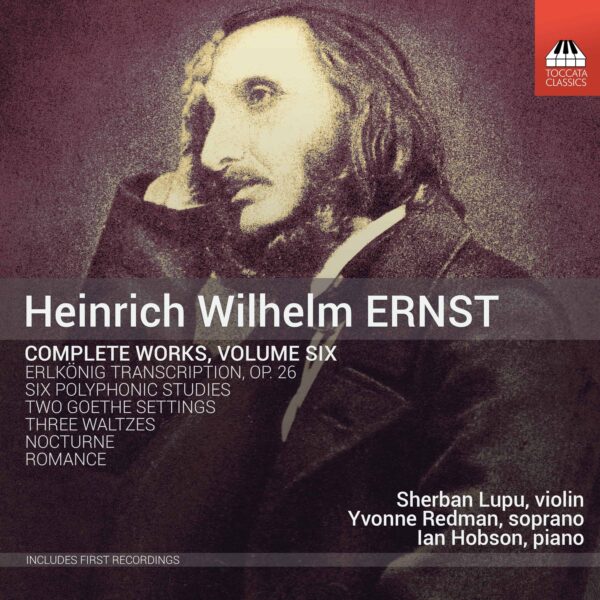
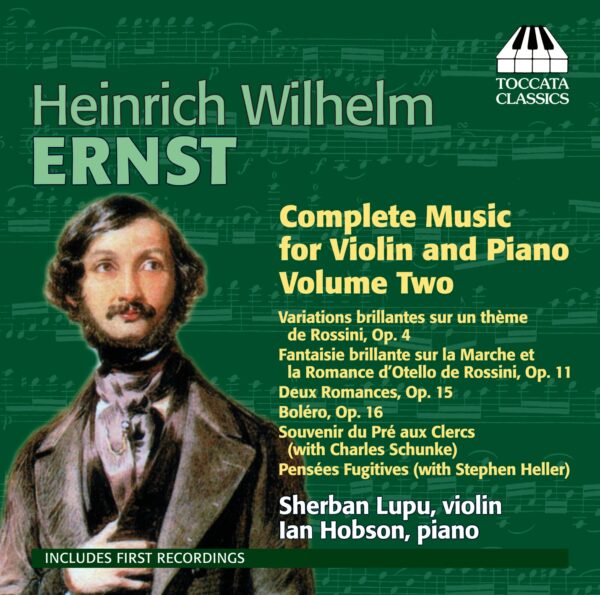
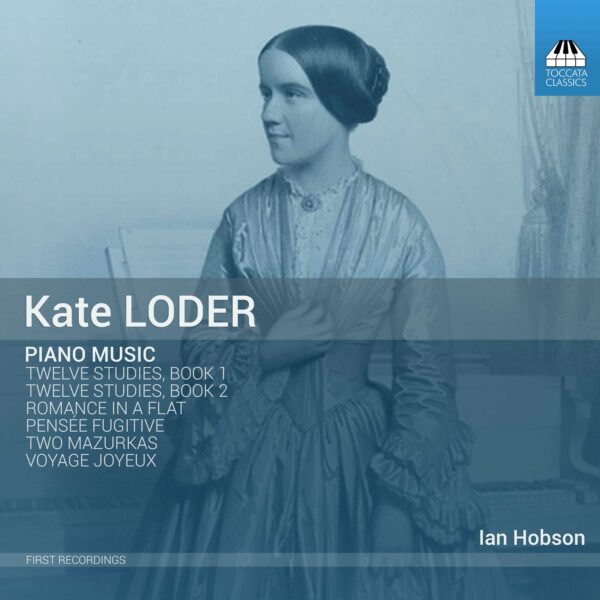
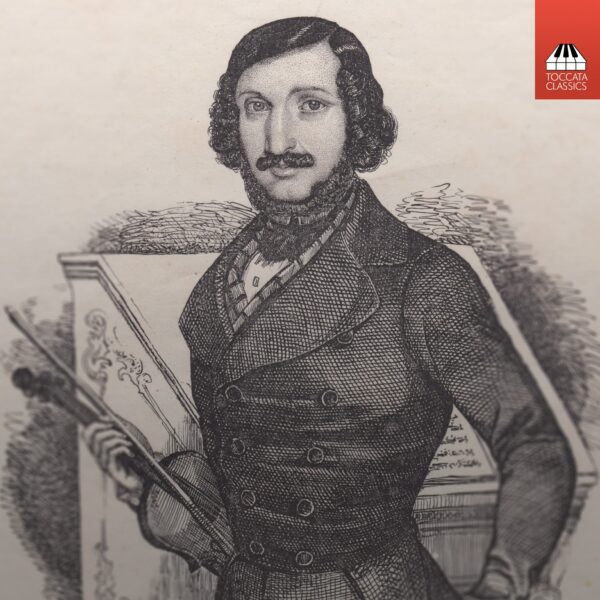
Jochen Brusch :
Please consider me as a fan of the Ernst Edition by Toccata Classics. Sherban Lupu is a brillant performer and the herculian task to record the complete output of H.W. Ernst makes him to an hero for me.
His former Ernst-recordings (volumes 1-4) have been a great inspiration for me.
2 Years ago I myself gave a concert exclusevely with works by H.W. Ernst. This wouldn’t have been possible without the pioneer feats by Mr. Lupu.
Thank You!
Jochen Brusch.
Dennis E. Ferrara :
“Sherban Lupu is certainly one of these chosen few who has a splendid technique to accomplish the demands placed on the violinist by this 19th century virtuoso. … Ian Hobson’s brilliant accompaniments add much as this ‘artistic’ team performs some of the most challenging of 19th century violin repertoire. Balance, color, phrasing as well as nuance, the flavor for the dramatic and the excitement of playing in the ‘grand manner’ are characteristics of this superb recital. All the compositions deserve high praise and merit and each demonstrates the art of the composer and performer. Excellent program notes are educational here. The recording is warm and the balance between violin and piano is noteworthy.” –Amazon review, January 2016
MusicWeb International :
‘The quantity of premiere recordings in this fifth volume of the complete Ernst series is high: fully fifty percent of the works have never before been graced by performance on disc. This is auspicious for the Ernst lover though the listener rather more casually interested in the development of violin performance and composition in the decade between 1833-42 may well view this as a niche-within-a-niche. Sherban Lupu and Ian Hobson, as well as Toccata, remain indomitable. … The Rondinos use material from operas popular and fashionable at the time, sure concert sellers therefore for the audiences lured to hear this so-called second Paganini. … it’s Halévy’s La Tentation – an opera-ballet – that deserves the most praise, a carefree balletic piece full of grace with a degree of appropriate pathos to keep the emotional temperature from sinking too low. Mark Rowe’s characteristically excellent notes … presents a chart detailing the form of the Polonaise de Concert, Op.17 so you can follow the episodes with an eye on the clock counter. This shows how well-constructed Ernst’s pieces invariably are, even the slightest. … Standards are very much up to the expected level by now – a certain very occasional thinness in Lupu’s tone is of no great consequence – so we can look forward to volume six with expectation.’
—Jonathan Woolf, MusicWeb International
Fanfare Magazine :
‘Sherban Lupu, who must have a will of iron to attempt such a comprehensive survey of violinistic torture, acquits himself well in this gargantuan piece, with a tone stropped to a sharp edge, a firm technical command, and a general sense of both comedy and tragedy. He never wallows in a manner suggestive of a later generation of Romanticism; and he makes the 12 minutes flash by seemingly in seconds. […]
The recorded sound, clear and spacious, once again presents the duo in a highly favorable light. Those who have enjoyed the earlier volumes of the series should find this one equally fascinating. At times, especially in the simpler short works, it reveals to an exceptional degree, in fact, a more direct side of the composer’s musical personality. Strongly recommended.’
—Robert Maxham, Fanfare Magazine, July 2016